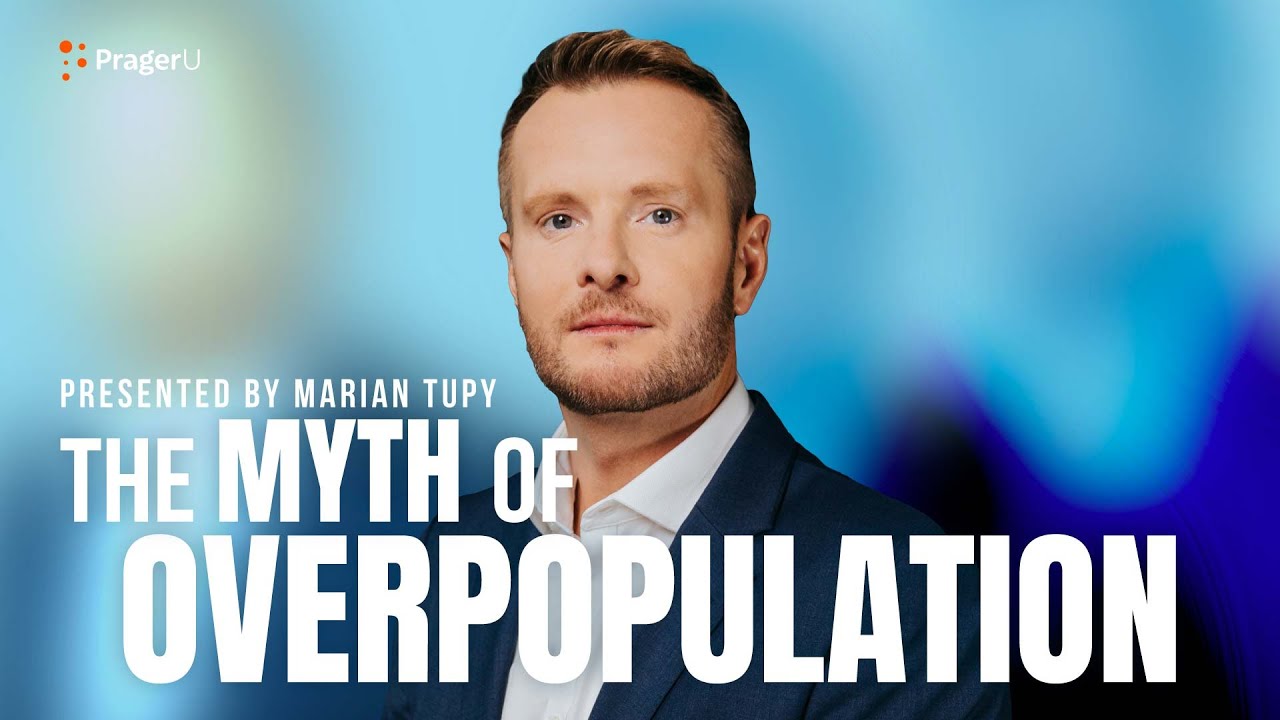
The Myth of Overpopulation
There are now eight billion people living on the planet. Is there enough room for all of us? Are we going to run out of food and other resources? Marian Tupy, Senior Fellow at the Cato Institute and co-author of Superabundance, examines whether or not these fears are valid. His answer may surprise you.
SUBSCRIBE 👉 https://www.prageru.com/join
Script:
There are now eight billion people living on the planet.
Is there enough room for all of us? Aren’t we going to run out of natural resources? How are we going to feed everybody?
These are not new questions. Doomsayers have been asking them for at least 200 years.
In 1798, an English economist named Thomas Malthus, wrote his famous Essay on the Principle of Population. In it, Malthus claimed that population grew exponentially, while resources needed to feed that population grew at a linear rate.
The difference between the two growth rates, he argued, must lead to starvation.
Malthus was wrong. And not by a little; by a lot. As the population grew, food production improved … and so did almost everything else.
Consider the life of a typical American blue-collar worker over the span of a century. Using a unit of measurement known as time prices, we can estimate the amount of time someone would have to work to buy a given item.
Between 1900 and 2018, the length of time our blue-collar worker had to work to earn enough money to buy a pound of pork fell by 98%, to buy a pound of rice by 97%, to buy a pound of coffee, 94%.
While people can’t eat rubber, aluminum, or cotton, these commodities are valuable inputs in the production processes that impact the prices of goods and services, and hence the overall standard of living. Their prices fell by 99%, 98% and 96% respectively — while the population of the United States rose from 76 million to 328 million.
Famines, which were once common, have disappeared outside of war zones. In much of the world today, it’s obesity not starvation, that’s a problem.
This relationship between population growth and abundance may seem counterintuitive, but it’s true.
Remember this chart that so frightened Malthus? The reality looks very different.
The more people we have, the more abundance we have. Relative to previous generations, we now live in a world of superabundance — the term that my colleague and co-author, Gale Pooley and I have coined and use as the title of our book.
What makes this superabundance possible?
The answer is knowledge.
Thomas Sowell, the brilliant Hoover Institution economist, explains it this way:
The difference in the standard of living between the cavemen and us is not natural resources. The difference is knowledge. We have a lot more of it. And we use that knowledge to make things from the same natural resources that existed during the time of the cavemen, but which the caveman could never have imagined.
Let’s look at something as simple as a grain of sand. It has been lying around for billions of years. Then, some 4,500 years ago, someone figured out that by heating sand to just over 3,000 degrees Fahrenheit, sand could be turned into glass beads, then glass jars, and much later, windowpanes.
With every step of discovery, the value produced from a grain of sand increased. Today, we use glass in fiber optic cables and computer microchips, turbocharging our productivity, thus making us much more prosperous than our ancestors.
Counting the quantity of known raw materials, like Malthus and many other people have done, might seem logical, but it misses the ingredient that changes everything: knowledge.
And new knowledge emerges from the human mind. A newborn comes into the world not only with an empty stomach, but also a brain capable of intelligent, potentially world-changing thought.
So, what really matters is not the finite number of atoms on the planet, be they of copper or zinc or any other element, but the human ability to combine and recombine those atoms in ever more valuable ways.
Therefore, we can confidently say that economic growth is less about resources, which are limited, and more about knowledge, which is limitless.
As the Nobel Prize-winning economist Paul Romer put it, new ideas “do not add up. They multiply.”
For the full script, visit: https://www.prageru.com/video/the-myth-of-overpopulation
source











We all agree there's enough resources ( food – water – space) for everyone but the question is can everyone access this resources No you can not you have to pay money to get this resources so , inability to obtain = no enough resources , poverty = overpopulation ,
Second high salary jobs is the only way that gives you access to the resources all the year and we have few high salary jobs compare to unemployment and low income rates , finally we have overpopulation on those high salaries jobs .
So did your knowledge solve the poverty problems because if you have high rates of poverty and low income people that's mean overpopulation is problem
Just because Norman Borlaug managed to pull a rabbit out of a hat, that is no reason to believe that humanity can do this at will, that we have unlimited rabbits.
"Famines have disappeared outside of warzones."
Aside from the obvious factor that wars frequently start because of famInes, this statement is false.
Food and Agriculture Organization of the United Nations
Rome, 2019
"Hunger is on the rise in almost all subregions of Africa, where the prevalence of undernourishment has reached levels of 22.8 percent in sub-Saharan Africa, and to a lesser extent in Latin America. In Asia, despite great progress in the last five years, Southern Asia is still the subregion where the prevalence of undernourishment is highest, at almost 15 percent, followed by Western Asia, at over 12 percent, where the situation is worsening."
"Obesity is on the rise in almost all countries, contributing to 4 million deaths globally. The increase in prevalence of
obesity between 2000 and 2016 has been even faster than that of overweight. No region is exempt from the epidemic of overweight and obesity. The prevalence of overweight is increasing in all age groups, with particularly steep increases among school-age children and adults."
https://www.fao.org/3/ca5162en/ca5162en.pdf
Famine and obesity are facets of the same problem, chronic malnutrition. And it IS a worldwide problem.
"This relationship between population growth and abundance may seem counterintuitive."
The relationship presented here is a common logical fallacy: "Correlation does not equal causation". Example: "Every morning the rooster crows. Every morning the sun comes up. Therefore, the sun comes up because the rooster crows."
"Can we continue to live in a superabundant world? That depends on two components: People and Freedom."
This represents a shallow and simplistic kind of reasoning characteristic of many if not most PragerU presentations. "From incorrect premises, based on local situations and our abilities, bad policies are likely to follow.”
"Famines have disappeared outside of warzones."
False premise.
"Population growth" and "Abundance".
False cause-effect relationship.
There are many factors which the presenter fails to take into account but which have a direct effect on the issue. Factors such as:
Politics
Weather
Evil people
Natural disasters
Pollution
Religion
The world imagined by this presentation exists only on the planet Ifonly.
Ok yes true if we didn't live so wastefull earth could handle more people, but now we do live extremely wastefull so yes there is to much people!!!
"Malthus was wrong back then, therefore overpopulation can never happen in the future". This fallacy is called "arguing from history". The pig that gets fed every day by the farmer doesn't expect the farmer to come one day with an axe. PragerU has been known for their climate change denial propaganda and other cornucopian attitudes.
Cornucopians are people who actually believe that resources on Earth are not finite and that their number could be magically increased by the brain power of billions of (mostly uneducated) people. The more the better!
Yes, I do!
I want to see the human population stabilize (100 years from now?) at one billion.
But, no crash programs please. A long, slow reduction is needed.
Absolutely. No relationship between the number of people and the net amount of damage people do to the planet.
The extreme weather increasing at an exponential rate totally isn't evidence that we have already crossed the limits of planetary sustainability a long time ago.
This kind of talk definitely isn't the sort of thing an animal species that has developed cognitive thought would tell itself to convince itself it's ok to keep reproducing and use all available resources, like it's biological programming dictates, even in the face of increasing ecological collapse. Well done.
capitalism is a pyramid scheme that requires infinite economic growth, that also means infinite population growth… I N F I N I T E understand that word ?
that's why right wingers want you to believe there is no problem, because they like capitalism.
if the worlds population stops increasing then capitalism goes into recession and depression and finally collapse, leading to mass unemployment starvation and civil wars.
capitalism is the problem.
There is so much empty space we could build housing for everyone, homelessness should not even exist!
Underpopulation is more scary
Overpopulation arguments just end up being too many poor and Black people need to be reduced and sterilized. Sick
Plus, it's interesting how all comments here are so 'supportive'- Prager "University" speaks in an echo chamber. No critical evaluation possible.
Very optimistic, BUT COMPLETELY ignores the fact that we've already over-taxed the planet with our growth and demands. Animal species populations have declined by almost 70% in the last 50 years. Is that sustainable? We can't live alone on this planet, no matter how many grains of sand there are. And is it hot enough for you yet? Foolish optimism.
More brains, more brainstorming, more knowledge, more technology and science.
GOLD
Marian, Points you are do not understand and do not mention is the lost of Flora and Fauna which are dwindling to extinction due to over production of good and bad foods, materials we absolutely do not need and are foolishly worthless and that they distract the population from the true issues. Obesity is simply due mainly to inactivity and over eating the wrong poor nutritional satiating foods and being sedentary. The general population never gets any exercise at work or home. The most exercise they get is taking a shower. We are factual way over populated. in fact we lost one of the world 3 great migrations the American Bison in order to murder and annihilate the American Indians to feed the illegal Europeans invaders. The other 2 great migration are on the verge of collapse due to over populations. I guess though, you are only thinking of where you go when you personally die and not thinking of the destruction of ecosystem that wholly support our lives.
There's simple no greater force of bias in the human mind than misanthropy. No matter how much facts, reason, and logic you throw their way people will still believe the world is better place with less people.
Stop NWO/WEF and start the trials in Nurnberg ASAP!
If you bet on future knowledge to get us out of this mess, then you should also be aware that not all future knowledge is beneficial as others can cause tectonic disruptions to civilizations. Same point also, there are an infinite number of atomic combinations that can be used in ways to unjustly appropriate or destroy resources and how it is allocated.
Information distribution is not the same as before. Now, information has been subjected to proprietary rights, and secrecy. As more and higher quality information is required in a process, so does the costs to employ it also rise. This leads to some cap in the effect of technology which at present is already moving marginally in existing sectors.
It is foolish to bet on a possibility when it is not the only outcome and whose effects might only be incremental.